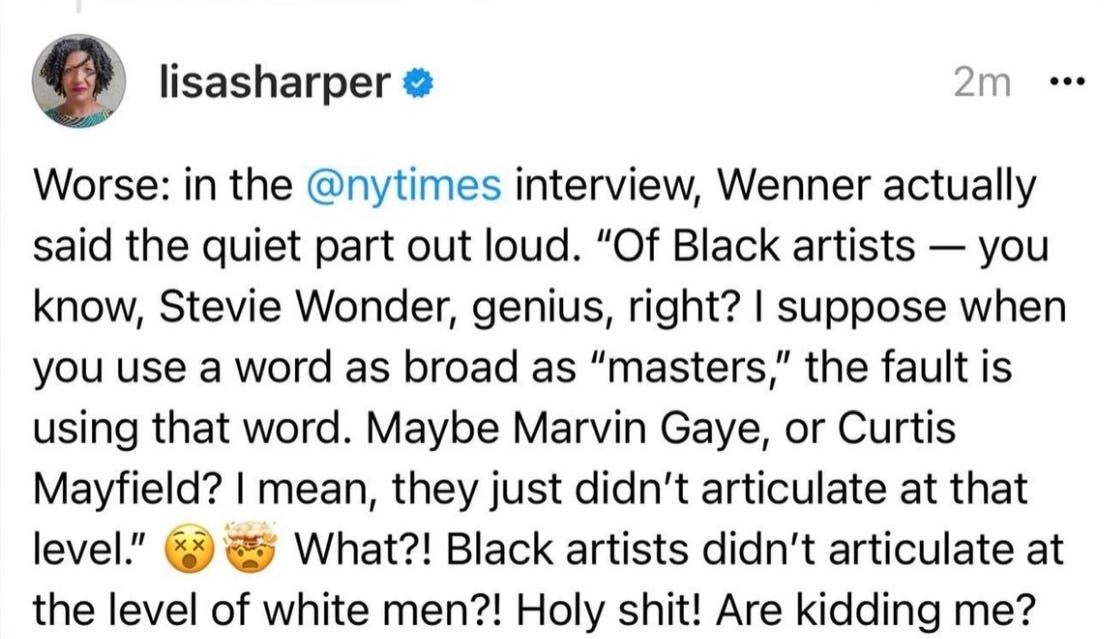Jann Wenner is exhibit A on why the phrase "imposter syndrome" doesn't capture the problem.
People aren't imagining the double standard.
Sunday, I was scrolling through Instagram and saw a post by my friend
expressing incredulity and outrage about comments made by former Rolling Stone editor Jann Wenner about Black and female musicians.I had to read the post multiple times to ensure I understood what was being said because it was so explicitly and unapologetically racist and misogynistic.
It's not that I was surprised that Wenner holds these views.
It just was hard to wrap my mind around the fact he felt so comfortable expressing them to the New York Times as part of a book promotion tour.
In 2023.
Wenner told the New York Times that he featured only white men in his book, The Masters, because Black performers weren't in his "zeitgeist.”
He claimed that having a deep or philosophical conversation with Janis Joplin or other great female artists was impossible. The white men he interviewed were, he asserted, "the philosophers of rock."
Then this: "Maybe I should have gone and found one Black and one woman artist to include here that didn't measure up to that same historical standard, just to avert this kind of criticism…Maybe I'm old-fashioned and I don't give a [expletive] or whatever."
Or maybe you should not have had your job, Jann Wenner, since you were blinded to what was right in front of your nose.
The thing is, he was always like this.
I happen to live with a person who wrote a seminal book about Rolling Stone and so knows a lot about Wenner.
My husband, the author and New York Times writer Robert Draper, wrote extensively about Wenner's casual misogyny and ignorance of cultures other than his own white male milieu—ironic since Rolling Stone purported to be the Bible of the counterculture.
Robert's 1990 book chronicles Wenner's egregious behavior. He told me:
Wenner hosted staff retreats but only invited the men (and photographer Annie Leibowitz to visually chronicle the goings-on). He often dictated to his critics that his friends—uniformly white male musicians—receive 5-star reviews while at the same time ridiculing hip-hop and ignoring nearly all non-Anglo music.
During its first decade (1967-77), female staffers were 'coffee chicks' while the marquee writers like Hunter S. Thomas and Joseph Eszterhas were, you guessed it, white dudes. Though many newsrooms suffered from this affliction back in the day, Rolling Stone represented itself as the arbiter of cultural enlightenment, even iconoclasm. But it wasn't. And that's because of the white guy at the top, for whom the musical pantheon consisted exclusively of white men. A half-century later, that hasn't changed for him.
This brings us to so-called "imposter syndrome."
Imagine you were a Black or female artist during this time, wondering why a major gatekeeper of the music scene didn't treat you with respect. If you dared to complain, you would have been told by people like Wenner that you were conjuring up this scenario in your head. If anyone admitted it was happening, they would say to you that it was your fault.
Because you just weren't good enough.
You didn't meet the "objective" standards of greatness created by people like Wenner.
The Washington Post's Perry Bacon had a great piece about how there is a subset of white men (which includes some Democratic men) who "cast themselves as nonideological and neutral while arguing that those who criticize them are dogmatic and nonobjective."
But they are no more "objective" than Jann Wenner was in his assessment of musicians.
The concept of "imposter syndrome" was developed in the 1970’s to help women who disproportionality felt inadequate in work environments. But it didn't account for systemic issues like racism, xenophobia, classism, and misogyny.
"Imposter syndrome took a fairly universal feeling of discomfort, second-guessing, and mild anxiety in the workplace and pathologized it," noted the Harvard Business Review in a piece urging people to stop using the phrase.
Calling it a "syndrome" makes it seem like an illness. All you need to be cured is to give up your distorted thinking and low self-worth.
But the fact is, many people are imposters.
They work with people or serve audiences that don't accept them and hold them to different — often higher — standards than others around them.
Telling people they are crazy for feeling this way only adds insult to injury.
What is so chilling about the Wenner interview is that he is just saying out loud what many gatekeepers of his era thought and, unfortunately, probably still feel. It makes me think of all the people who were never given an opportunity because of his racism and misogyny, dressed up as objectivity and taste.
It makes me think of how, for most of my life, people said, "Women are just not as funny as men.” This was just an “objective” truth.
From a New York Times article about Saturday Night Live:
"Women aren't funny," or so John Belushi often howled on the set of "Saturday Night Live" in the late 70's. Back then, the show's male writers were fond of saying that possessing male genitalia made comedy writing easier. The producers offered little consolation when the women complained that they received too many subordinate, straight roles.
Fast forward to today, and lo and behold, there are lots of funny women, and not just on SNL.
Did women become funnier?
This seems unlikely.
How many women were never allowed to thrive as comedians because of this "objective" view of comedy?
We could do this thought experiment all day with other industries and go even longer if we replaced “women” with “people of color.”
When I think of "changing the channel," there are few things that I can think of that need more of a shift than the worldview Jann Wenner proudly shared in that interview.
As chilling as his interview was to read, there is some small comfort in obtaining yet more proof that the problem is not that some people feel like they are imposters, but that too many people with power see them that way.








How ironic. Regarding black greatness in many musical genres, the exact opposite is true. Didn’t black artists originate Blues, Soul, Rock n Roll etc No one played the electric guitar like Hendrix. I play in a local rock band and a couple of years ago we had an awesome female singer. I grew up with 70’s prog rock and female rockers were sadly underrepresented in the top British bands.
"...the problem is not that some people feel like they are imposters, but that too many people with power see them that way." Spot on. Patriarchal and bigoted gaslighting have been things since Adam. And it survives to this day because entrenched power has a distinct advantage and the majority of society have capitulated. Harsh, but I don't know any other way to describe the core of this ongoing injustice. We keep complaining but nothing changes because the people we are complaining about are shameless. In fact, the more pathological types take pleasure in our discomfort. History teaches an honest lesson for those with the courage to look. Social progress is won by organization, pain and a mighty effort. Boycotts, civil disobedience, strikes and focused leadership prevail when words fail.